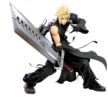List of spirits (Final Fantasy series)
From SmashWiki, the Super Smash Bros. wiki
Jump to navigationJump to search
The following is the list of the Spirits from the Final Fantasy series in Super Smash Bros. Ultimate.
Fighter Spirits
| No. | Image | Alternate Artwork | Name | Origin Game | Acquisition |
|---|---|---|---|---|---|
| 1,004 | Cloud | Final Fantasy VII (Artwork: Super Smash Bros. Ultimate) |
•Complete Classic Mode with Cloud •Purchase from the Vault Shop for 300G (after unlocking Cloud) | ||
| 1,005 | Cloud (Advent Children) | Final Fantasy VII: Advent Children (movie) (Artwork: Super Smash Bros. Ultimate) |
•Complete Challenge (Smash): As Cloud, hit an opponent with his side special, Cross Slash, while the Limit Gauge is charged. •Purchase from the Vault Shop for 300G (after unlocking Cloud) | ||
Series Order
| Number | Name | Series |
|---|---|---|
| 1,004 | Cloud | FINAL FANTASY VII |
| 1,005 | Cloud (Advent Children) |
Trivia
- Final Fantasy is the only series represented only by its respective playable character, without any additional type of spirit depicting them.
- Final Fantasy is the only series represented by a fighter not to use any art originating from its own series for their spirits, using only Cloud's Super Smash Bros. Ultimate art instead.
- Final Fantasy is one of the only fighter-represented universes not to have any female spirits, the others being Yoshi, Game & Watch, R.O.B., Punch-Out!!, and Fatal Fury.
- Final Fantasy is the only series represented by a fighter not to have any spirits besides Fighter Spirits.
- Despite several Final Fantasy summon characters appearing on Midgar, their nature as special 2D sprites, and their other role as profile pictures in the previous game, they do not have spirits.
- Before the final release of the game, many people had believed that the Final Fantasy series would have no spirits at all, due to factors such as Midgar once again having only two music tracks, Cloud being solely voiced in Japanese, and a rumor that stated Cloud was absent from World of Light. In reality, it was a combination of prior copyright management during the development of Ultimate and licensing issues that arose from the ownership of the Final Fantasy series artwork.
| Spirits | |
|---|---|
| by categories | Primary spirit (Enhanceable spirit) · Support spirit · Master spirit · Fighter spirit · (All spirits) · Summon · DLC Spirits (DLC changes) |
| by series | Super Mario · Donkey Kong · The Legend of Zelda · Metroid · Yoshi · Kirby · Star Fox · Pokémon · EarthBound · F-Zero · Ice Climber · Fire Emblem · Game & Watch · Kid Icarus · Wario · Metal Gear · Sonic the Hedgehog · Pikmin · R.O.B. · Animal Crossing · Mega Man · Wii Fit · Punch-Out!! · Pac-Man · Xenoblade Chronicles · Duck Hunt · Street Fighter · Final Fantasy · Bayonetta · Splatoon · Castlevania · Mii · Super Smash Bros. · Others · Persona · Dragon Quest · Banjo-Kazooie · Fatal Fury · ARMS · Minecraft · Tekken · Kingdom Hearts |
|
| |
|---|---|
| Fighters | Cloud (SSB4 · SSBU) · Sephiroth (SSBU) |
| Stages | Midgar · Northern Cave |
| Other | Aerith Gainsborough · Bahamut ZERO · Barret Wallace · Chocobo · Ifrit · Leviathan · Odin · Ramuh · Tifa Lockhart |
| Trophies & Spirits | Trophies · Spirits |
| Music | SSB4 · Ultimate |
| Related universe | Kingdom Hearts |

